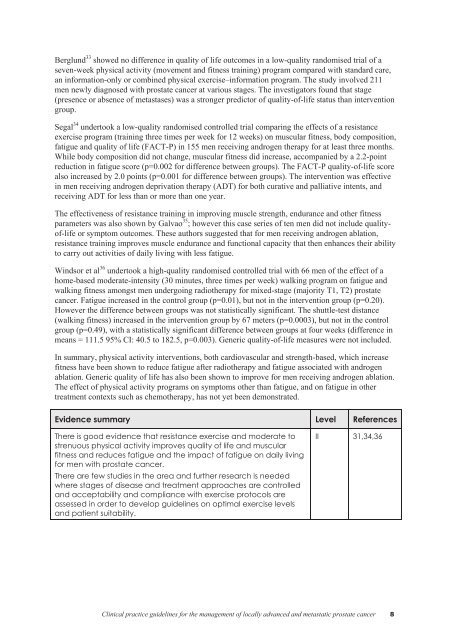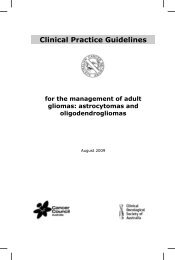Clinical Practice Guidelines for the management of locally advanced ...
Clinical Practice Guidelines for the management of locally advanced ...
Clinical Practice Guidelines for the management of locally advanced ...
Create successful ePaper yourself
Turn your PDF publications into a flip-book with our unique Google optimized e-Paper software.
Berglund 33 showed no difference in quality <strong>of</strong> life outcomes in a low-quality randomised trial <strong>of</strong> a<br />
seven-week physical activity (movement and fitness training) program compared with standard care,<br />
an in<strong>for</strong>mation-only or combined physical exercise–in<strong>for</strong>mation program. The study involved 211<br />
men newly diagnosed with prostate cancer at various stages. The investigators found that stage<br />
(presence or absence <strong>of</strong> metastases) was a stronger predictor <strong>of</strong> quality-<strong>of</strong>-life status than intervention<br />
group.<br />
Segal 34 undertook a low-quality randomised controlled trial comparing <strong>the</strong> effects <strong>of</strong> a resistance<br />
exercise program (training three times per week <strong>for</strong> 12 weeks) on muscular fitness, body composition,<br />
fatigue and quality <strong>of</strong> life (FACT-P) in 155 men receiving androgen <strong>the</strong>rapy <strong>for</strong> at least three months.<br />
While body composition did not change, muscular fitness did increase, accompanied by a 2.2-point<br />
reduction in fatigue score (p=0.002 <strong>for</strong> difference between groups). The FACT-P quality-<strong>of</strong>-life score<br />
also increased by 2.0 points (p=0.001 <strong>for</strong> difference between groups). The intervention was effective<br />
in men receiving androgen deprivation <strong>the</strong>rapy (ADT) <strong>for</strong> both curative and palliative intents, and<br />
receiving ADT <strong>for</strong> less than or more than one year.<br />
The effectiveness <strong>of</strong> resistance training in improving muscle strength, endurance and o<strong>the</strong>r fitness<br />
parameters was also shown by Galvao 35 ; however this case series <strong>of</strong> ten men did not include quality<strong>of</strong>-life<br />
or symptom outcomes. These authors suggested that <strong>for</strong> men receiving androgen ablation,<br />
resistance training improves muscle endurance and functional capacity that <strong>the</strong>n enhances <strong>the</strong>ir ability<br />
to carry out activities <strong>of</strong> daily living with less fatigue.<br />
Windsor et al 36 undertook a high-quality randomised controlled trial with 66 men <strong>of</strong> <strong>the</strong> effect <strong>of</strong> a<br />
home-based moderate-intensity (30 minutes, three times per week) walking program on fatigue and<br />
walking fitness amongst men undergoing radio<strong>the</strong>rapy <strong>for</strong> mixed-stage (majority T1, T2) prostate<br />
cancer. Fatigue increased in <strong>the</strong> control group (p=0.01), but not in <strong>the</strong> intervention group (p=0.20).<br />
However <strong>the</strong> difference between groups was not statistically significant. The shuttle-test distance<br />
(walking fitness) increased in <strong>the</strong> intervention group by 67 meters (p=0.0003), but not in <strong>the</strong> control<br />
group (p=0.49), with a statistically significant difference between groups at four weeks (difference in<br />
means = 111.5 95% CI: 40.5 to 182.5, p=0.003). Generic quality-<strong>of</strong>-life measures were not included.<br />
In summary, physical activity interventions, both cardiovascular and strength-based, which increase<br />
fitness have been shown to reduce fatigue after radio<strong>the</strong>rapy and fatigue associated with androgen<br />
ablation. Generic quality <strong>of</strong> life has also been shown to improve <strong>for</strong> men receiving androgen ablation.<br />
The effect <strong>of</strong> physical activity programs on symptoms o<strong>the</strong>r than fatigue, and on fatigue in o<strong>the</strong>r<br />
treatment contexts such as chemo<strong>the</strong>rapy, has not yet been demonstrated.<br />
Evidence summary Level References<br />
There is good evidence that resistance exercise and moderate to<br />
strenuous physical activity improves quality <strong>of</strong> life and muscular<br />
fitness and reduces fatigue and <strong>the</strong> impact <strong>of</strong> fatigue on daily living<br />
<strong>for</strong> men with prostate cancer.<br />
There are few studies in <strong>the</strong> area and fur<strong>the</strong>r research is needed<br />
where stages <strong>of</strong> disease and treatment approaches are controlled<br />
and acceptability and compliance with exercise protocols are<br />
assessed in order to develop guidelines on optimal exercise levels<br />
and patient suitability.<br />
II 31,34,36<br />
<strong>Clinical</strong> practice guidelines <strong>for</strong> <strong>the</strong> <strong>management</strong> <strong>of</strong> <strong>locally</strong> <strong>advanced</strong> and metastatic prostate cancer<br />
8



